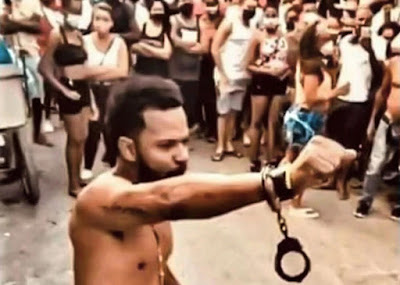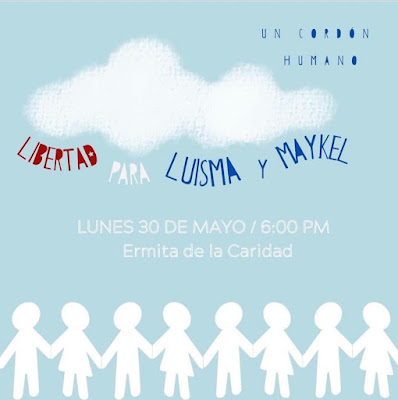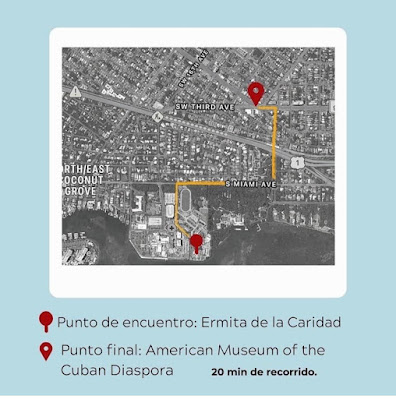"Long live human rights, with my blood I wrote to you so
that this be saved as evidence of the savagery we are subjected to that are victims of the Pedro Luis Boitel political prisoners [movement]" - Orlando Zapata Tamayo, letter smuggled out April of 2004*
 |
| Orlando Zapata Tamayo May 15, 1967 - February 23, 2010 |
Orlando Zapata Tamayo was born on May 15, 1967
in Santiago de Cuba and died following a prolonged hunger strike on
February 23, 2010 in Havana, Cuba under suspicious circumstances.
Amnesty International recognized the pro-democracy activist and
human rights defender as a prisoner of conscience.
Orlando Zapata was a human rights
defender unjustly imprisoned in the Spring of 2003 and tortured by Cuban prison officials and state security agents over the
next six years and ten months. He died on February 23, 2010 following a prolonged hunger strike, aggravated by prison guards refusing him water in an effort to break his spirit. He is a victim of Cuban communism.
Christian Liberation Movement leader Oswaldo Payá Sardiñas, who was extrajudicially executed two and a half years later on July 22, 2012 together with Harold Cepero Escalante, the movement's youth leader, issued a statement
the same day that Orlando died and appeared in a photograph holding up a
photocopy of the martyred human rights defender's name and image.
"Orlando
Zapata Tamayo, died this afternoon, February 23, 2010, after
suffering many indignities, racist slights, beatings and abuse by prison
guards and State Security. Zapata was killed slowly over many days and many months in every prison in which he was confined. Zapata
was imprisoned for denouncing human rights violations and for daring to
speak openly of the Varela Project in Havana's Central Park.
He was not a terrorist, or conspirator, or used violence. Initially he
was sentenced to three years in prison, but after successive
provocations and maneuvers staged by his executioners, he was sentenced
to more than thirty years in prison."
 |
| Oswaldo Payá Sardiñas with photocopy image of Orlando Zapata Tamayo |
Amnesty International
had documented how Orlando had been arrested several times in the past.
For example he was temporarily detained on 3 July 2002 and 28 October 2002.
In November of 2002 after taking part in a workshop on human rights in
the central Havana park, José Martí, he and eight other government
opponents were arrested and later released. He was also arrested on December 6, 2002 along with fellow prisoners of conscience Oscar Elías Biscet and Raúl Arencibia Fajardo.
Dr. Biscet just released from prison a month earlier had sought to form a
grassroots project for the promotion of human rights called "Friends of
Human Rights." State security prevented them from entering the home of
Raúl Arencibia Fajardo, Oscar Biscet, Orlando Zapata Tamayo,Virgilio
Marante Güelmes and 12 others held a sit-in in the street in protest and
chanted "long live human rights" and "freedom for political prisoners."
They were then arrested and taken to the Tenth Unit of the National
Revolutionary Police, Décima Unidad de La Policía Nacional
Revolucionaria (PNR).
 |
Orlando Zapata Tamayo together with other activists
|
Orlando Zapata Tamayo
was released three months later on March 8, 2003, but Oscar Elias
Biscet, Virgilio Marante Güelmes, and Raúl Arencibia Fajardo remained
imprisoned. On
the morning of March 20, 2003 whilst taking part in a fast at the
Fundación Jesús Yánez Pelletier,
Jesús Yánez Pelletier Foundation, in Havana, to demand the release of
Oscar Biscet and the other political prisoners. Orlando was taken to the
Villa Marista State Security Headquarters.
He was moved around several prisons, including Quivicán Prison, Guanajay
Prison, and Combinado del Este Prison in Havana. Where according to
Amnesty International on October 20, 2003 Orlando was dragged along the floor of Combinado del Este Prison by prison officials after requesting medical attention, leaving his back full of lacerations.
Orlando managed to smuggle a letter out following a brutal beating it was published in April of 2004:
"My
dear brothers in the internal opposition in Cuba. I have many things to
say to you, but I did not want to do it with paper and ink, because I
hope to go to you one day when our country is free without the Castro
dictatorship. Long live human rights, with my blood I wrote to you so
that this be saved as evidence of the savagery we are subjected to that
are victims of the Pedro Luis Boitel political prisoners [movement]."*
On May 18, 2004 Orlando Zapata Tamayo, Virgilio Marante Güelmes, and Raúl Arencibia Fajardo were each sentenced to three years in prison for contempt for authority, disorderly conduct and resisting arrest
in a one-day trial. Orlando Zapata Tamayo would continue his
rebelliousness and his non-violent resistance posture while in prison
and suffer numerous beatings and new charges of disobedience and disrespect leading to decades added to his prison sentence in eight additional trials.
Protests for Orlando Zapata Tamayo continue
Eleven years have passed but the martyred Cuban human rights defender is not forgotten. From the beginning the regime sought to put down
and silence protests and acts of remembrance for him, but failed.
In
March
of 2010 at the second Geneva Summit for Human Rights
former prisoner of conscience Jose Gabriel Ramon Castillo testified to
what had happened to Orlando Zapata. In Norway, regime agents became
violent and created international controversy after a Cuban diplomat bit a young Norwegian-Cuban woman
for trying to record her mom engaged in a protest remembering Orlando
Zapata Tamayo in front of the Cuban Embassy in Oslo in May of 2010.
On September 30, 2010 the Canadian punk rock band I.H.A.D. released a
song linking what happened to Orlando Zapata Tamayo to the indifference
of Canadian tourists visiting Cuba asking the question: Where were you
the day Orlando Zapata died? On May 10, 2012 the Free Cuba Foundation
published a video accompanying the song, after receiving the band's
permission, with images and song lyrics.
On February 23, 2016 at the 8th edition of the Geneva Summit for Human Rights and Democracy Rosa María Payá
gave the last presentation in which she remembered and honored the memory of Orlando Zapata Tamayo on the sixth anniversary of his passing.
Today we remember the day this courageous activist was born in Cuba 54 years ago, and look forward to the day that his sacrifice is remembered in Cuba's history books.
*Source:
"Queridos hermanos míos de la oposición
interna de Cuba", escribió Zapata
en su misiva, "tengo muchas cosas que
decirles,
pero no he querido hacerlo por papel y
tinta,
pues espero ir a ustedes un día cuando
nuestra patria sea libre y sin dictadura
castrista.
Vivan los derechos humanos, con mi
sangre les
escribí, para que la guarden como parte
del salvajismo de que somos víctima el
presidio
político Pedro Luis Boitel". - "Golpiza y
celda tapiada para Orlando Zapata" La Habana, 22 de abril 2004 (María
López, Lux Info Press / www.cubanet.org





























